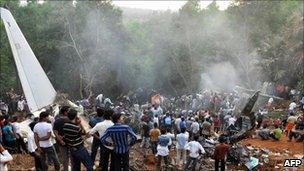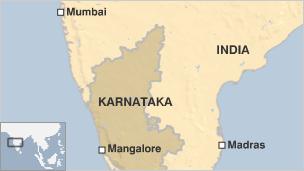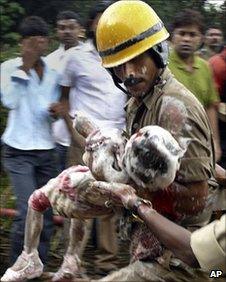India air crash families angry over crash report
- Published

The passenger plane crash was India's first for 10 years
Relatives of people killed in an Air India crash in May have reacted angrily to a leaked report which blamed a sleepy and disorientated pilot.
A spokesman for victims of the crash told the BBC that he wanted the airline to take immediate steps to protect passengers' lives in the future.
The Air India Express flight crashed near Mangalore, killing 158 people.
There has been no detailed response from the airline or the government into the report.
On Thursday, the airline repeated that it would not comment on the crash until the report is officially released - and then it would respond to the Indian government.
On Wednesday the airline pointed out that the media had reported on only a small part of the report.
Correspondents say that the full version may well reveal other factors contributing towards the crash, including a short runway and the fact that the pilot allegedly ignored his co-pilot's advice not to land.
'Overworked'
"Air India is morally responsible for the crash," Air Crash Victims' Families Association Secretary Dr Jayasimha Shetty said.

"Actually we are not surprised. We heard immediately after the crash that it could be pilot error," said Dr Shetty, who lost his sister and brother-in-law in the crash.
Dr Shetty told the BBC that the Serbian pilot of the crashed aircraft, Zlatko Glusica was experienced.
Both Mr Glusica and his co-pilot died in the crash.
"They [the pilots of Air India] are overworked. This is something they should take note of now the inquiry report has been submitted."
He said that the shortage of Air India pilots was causing them to work overtime.
However the BBC's Soutik Biswas in Delhi says that any suggestion that Mr Glusica was over-worked cannot be proved unless the families have details of his flight roster - and so far there is no evidence they do.
Our correspondent say that India - like other countries - has strict regulations to prevent pilots from flying too many hours.
But over the last three years pilots around the world have complained that long flying hours have put lives at risk - and that fatigue is a significant factor in accidents.
'Another insult'
Dr Shetty also criticised the compensation package announced by Air India for those affected by the crash, dismissing it as "too little".

There were only eight survivors of the crash, including this child
"Not many families have accepted what is being offered," he said.
"We are fighting for better compensation depending on victims' employment, income, dependents and the impact on their families."
The families were shocked recently when the memorial plaque installed at the crash site was destroyed by vandals.
"It is another insult to the victims of the families," he said.
Police have not been able to track the culprits and are not sure why the memorial was vandalised.
According to newspaper reports, data recorders captured the sound of snoring shortly before the crash and Mr Glusica is said to have been affected by "sleep inertia" after his nap.
Co-pilot H S Ahluwalia was reportedly heard making repeated warnings to the Serb to abort landing and try again.
Seconds before the plane erupted into a fireball, voice recordings picked up the co-pilot saying: "We don't have runway left."
The Boeing 737 overshot, plunged into a steep gorge and burst into flames. Only eight people survived.
Most of the passengers on the low-cost flight from Dubai to Mangalore were Indian migrant workers returning from the Gulf.
India's Civil Aviation Minister Praful Patel told reporters his ministry had received the report on Tuesday and the government would study it before taking any action.
A government official who did not want to be named told the Associated Press news agency that Indian media reports about the findings were accurate.
But the investigation would only be made public once it had been presented to parliament.
India's air safety record has been good in the past decade, despite a rapid increase in the number of private airlines and air travel in the country.
The tragedy was the country's first major air crash since one in the eastern city of Patna killed at least 50 people in July 2000.
- Published17 November 2010
- Published22 May 2010